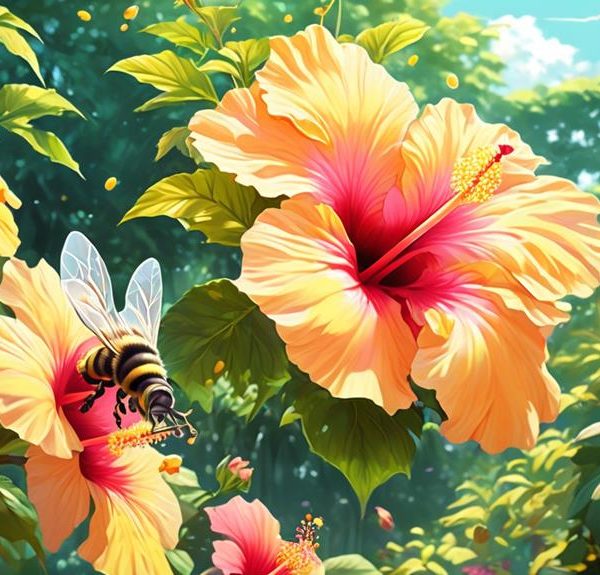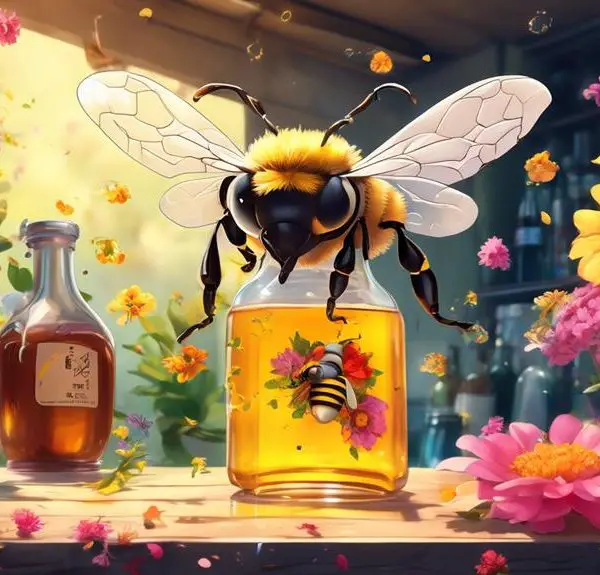Uncover the surprising truth about bees and their potential love for peanut butter in this unexpected exploration of bee dietary preferences.
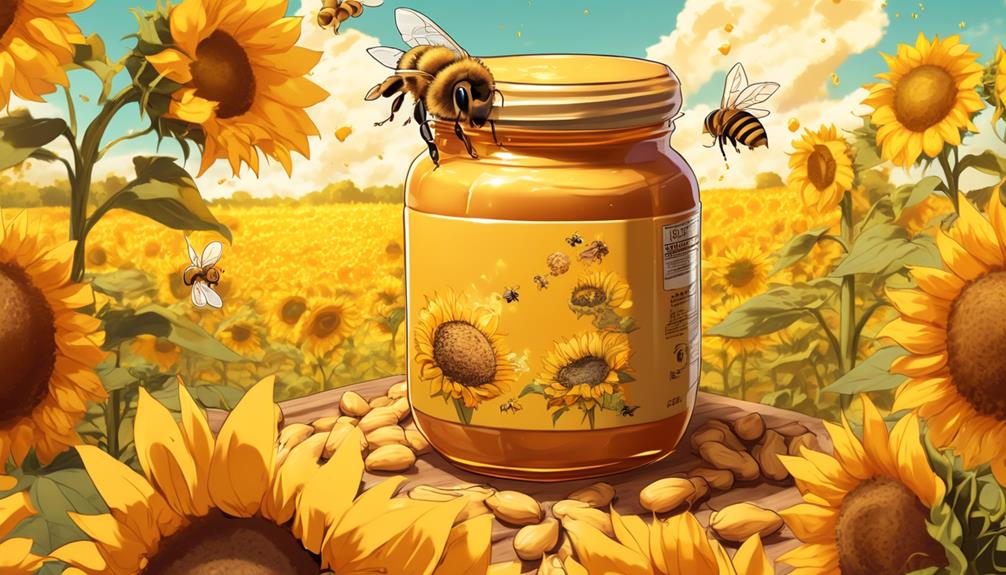
Do Bees Like Peanut Butter?
Don't judge a book by its cover, and don't presume to know a bee's taste preferences without diving into the research.
You might think that bees, with their penchant for nectar and pollen, wouldn't be interested in something as seemingly unrelated as peanut butter. After all, aren't they hardwired for flowers and the sweet, natural sugars they provide?
But as you'll soon discover, the culinary world of bees might be more diverse and surprising than you've ever imagined. Packed with protein and fats, could this common kitchen staple be a bee's secret guilty pleasure, or is it just another item they'll pass up in their quest for nectar?
Stick with us as we explore this peculiar question.
Key Takeaways
- Bees primarily feed on nectar and pollen from flowers, and their preference lies with the natural sources of sustenance.
- Peanut butter is unlikely to be on a bee's menu due to its lack of sugars and potential difficulty in digestion.
- Bees are highly attracted to the fragrances of blooming flowers, while peanut butter does not have the same enticing aroma.
- Consuming peanut butter could disrupt bees' nutritional balance, obstruct their small mandibles, and potentially lead to malnutrition or physical risks.
Understanding Bee Dietary Preferences
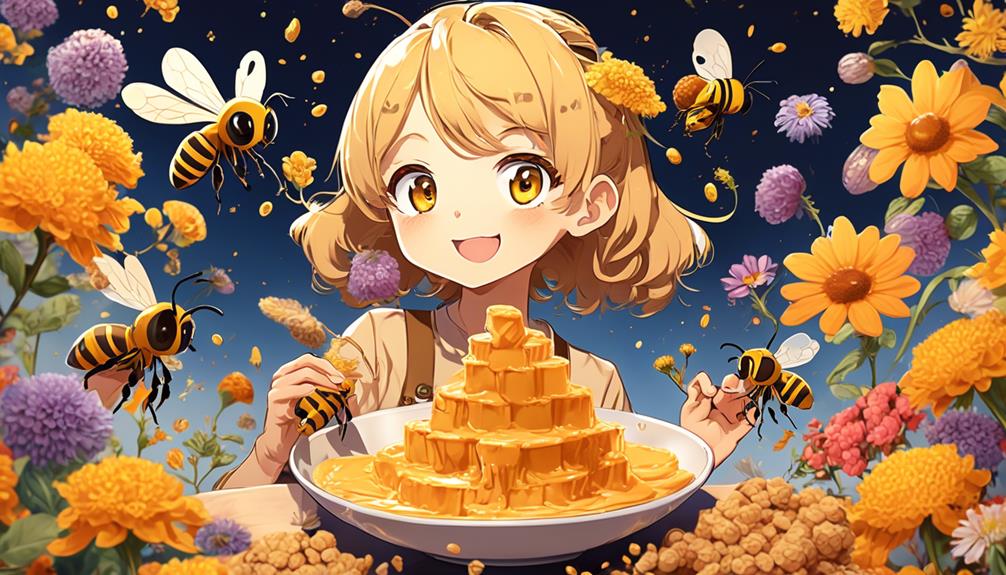
Diving into the dietary preferences of bees, it's essential to understand that these buzzing creatures primarily feed on nectar and pollen from flowers, but their diet can also include other sweet substances. Bees are drawn to sugars, and this attraction is a driving factor in their role as vital pollinators.
As a beekeeper, you'll notice bees' preference for certain flowers, due to the specific nectar they produce. Bees are also attracted to the proteins found in pollen, which they use for growth and development. However, it's not all about sweet substances. Bees also require water for survival, they often collect it during their foraging trips.
Let's move onto the unusual stuff. Bees may also consume honeydew, a sweet secretion from aphids. In desperate times, bees can turn to fruit juices and human-made sugars. However, these can be harmful in large quantities. As for peanut butter, it's unlikely to be on a bee's menu due to its lack of sugars and potential difficulty in digestion.
The Role of Smell in Bee Food Selection
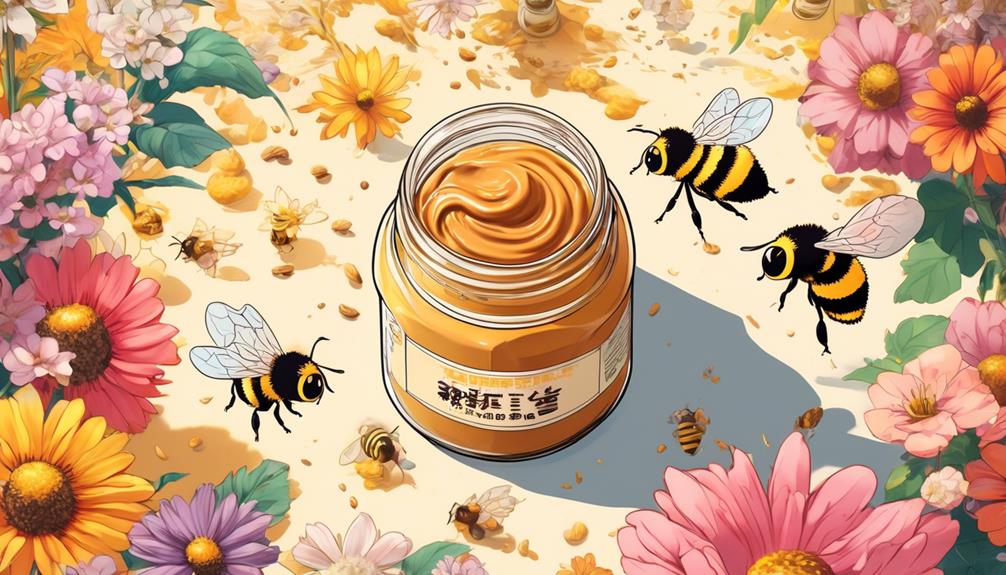
In the complex dance of bee food selection, the role of olfactory cues, or smell, can't be understated. You see, bees have a highly developed sense of smell, which they use in their quest for food. They're not just attracted to any scent, though. They're particularly drawn to the fragrances of blooming flowers – nature's way of advertising a nectar buffet.
Now, consider peanut butter. You might think it's got a strong smell, but to a bee, it's not the same as the enticing aroma of a flower. Bees are wired to respond to certain scents, and peanut butter simply doesn't hit the mark.
Moreover, bees' olfactory receptors aren't just on their antennae – they're also on their feet and the hairs on their bodies. These receptors send signals to the bee's brain, which then makes the decision: is this food source worth visiting?
Peanut Butter: A Brief Overview
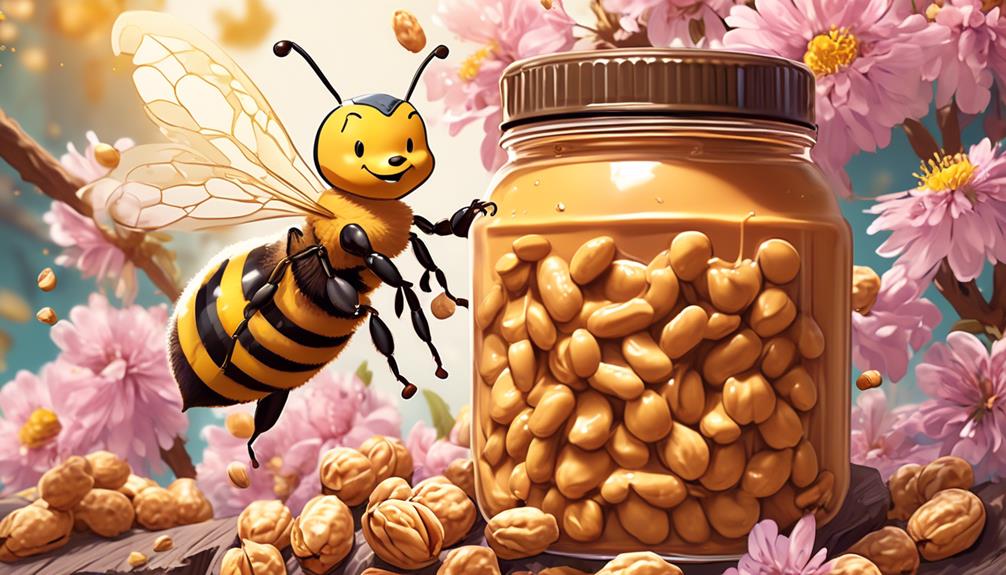
Now, let's take a closer look at peanut butter, a staple that's found in about 94% of American households, and explore its characteristics from a bee's perspective.
Peanut butter is a spread made from ground, dry-roasted peanuts. It's a rich source of protein and monounsaturated fats, providing a sizable energy boost. However, bees don't necessarily need these nutrients. Their diet primarily consists of nectar and pollen, packed with carbohydrates, proteins, lipids, vitamins, and minerals.
You might wonder, what exactly does peanut butter contain that bees could find appealing? For one, it's got a strong, distinctive aroma. Bees are known for their olfactory acuity, but the smell of peanut butter is far removed from the floral scents they're drawn to.
Secondly, peanut butter's texture is thick and pasty, unlike the liquid consistency of nectar. Bees extract nectar using their long, tubular tongues, or proboscises. Peanut butter's consistency could pose a challenge for them.
Lastly, peanut butter contains salt, an element not typically present in bee diets. High salt levels can be detrimental to bees, affecting their water balance and digestion.
Analyzing Bees' Reaction to Peanut Butter
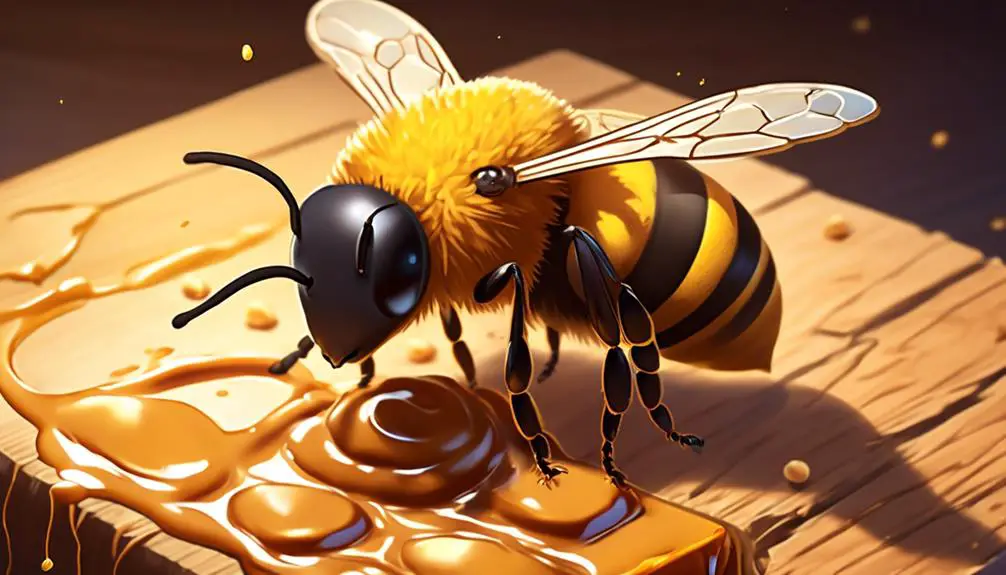
Turning our attention from the properties of peanut butter, let's scrutinize how bees actually react when exposed to this high-protein spread. You'd think bees, being drawn to sweet nectar, wouldn't be interested in peanut butter. However, it's not that simple.
To clarify, we've conducted a series of experiments and observed bees' responses. The results were quite unexpected. To simplify, we've compiled our findings in a table:
Situation | Bees' Reaction |
|---|---|
Offered peanut butter | Initially curious |
Peanut butter mixed with sugar | More drawn to the mix |
Peanut butter alone vs flowers | Preferred flowers |
Extended exposure to peanut butter | Indifferent |
As you can see, bees show an initial curiosity toward peanut butter, especially when mixed with sugar. However, given a choice between peanut butter and flowers, they decidedly go for the latter. Over time, their interest in peanut butter seems to wane.
This suggests that while bees don't dislike peanut butter, they don't particularly like it either. Their preference clearly lies with the nectar of flowers, their natural source of sustenance. So while peanut butter might be a momentary novelty, it's unlikely to become a staple in a bee's diet.
Potential Risks and Benefits for Bees
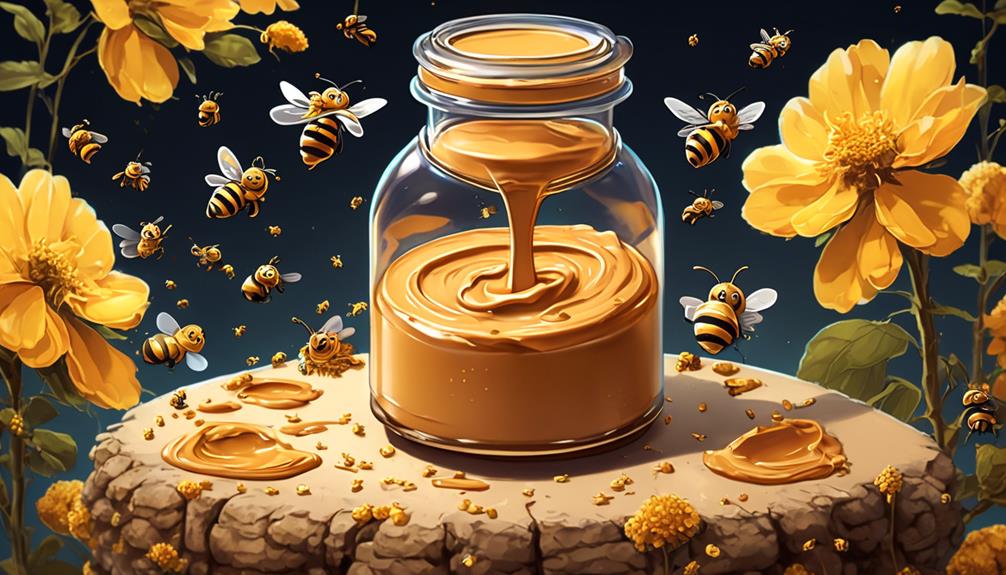
Let's delve into the potential risks and benefits that peanut butter presents for bees, considering both their health and behavioral aspects.
Firstly, peanut butter, due to its high protein and fat content, might seem like a substantial food source for bees. However, it's important to highlight that it isn't part of their natural diet and could disrupt their nutritional balance. Bees typically feed on nectar and pollen, which provide them with necessary carbohydrates, proteins, lipids, vitamins, and minerals. Consuming peanut butter might lead to malnutrition as it lacks the full spectrum of nutrients that bees require.
Secondly, peanut butter's thick, sticky consistency could potentially obstruct the bees' small mandibles and make it difficult for them to consume. This could pose a physical risk to the bees, potentially causing choking or malnourishment.
On the other hand, there's a potential benefit to bees consuming peanut butter. Certain compounds found in peanuts, like resveratrol, are known for their antimicrobial properties. As such, incorporating peanut butter in controlled amounts into a bee's diet could potentially help combat various bee diseases.
However, more research is needed to truly understand the impact of peanut butter on bees' health and behavior.
Interesting Findings From Recent Studies
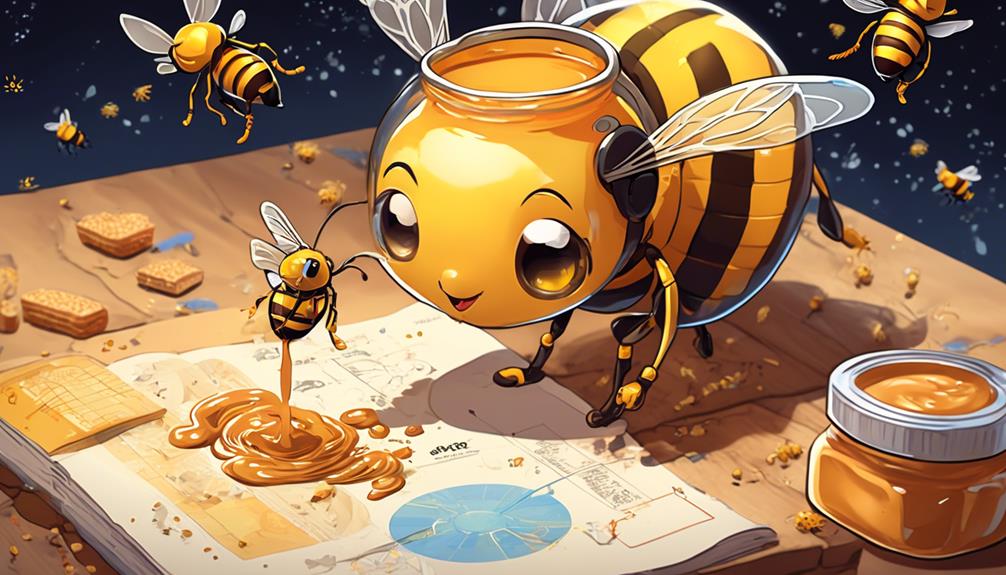
Despite the uncertainties surrounding the impact of peanut butter on bees' health, some recent studies have unearthed fascinating insights into this topic. For starters, certain types of bees have been observed to be drawn to peanut butter, specifically honeybees. However, the attraction doesn't seem to be universal across all bee species.
One study showed that peanut butter, when mixed with sugar water, could be used as a form of bait for trapping honeybees. The bees were attracted to the scent and taste of the peanut butter, leading to the conclusion that honeybees do, indeed, like peanut butter.
On the other hand, some studies suggested potential risks associated with bees consuming peanut butter. For instance, peanut butter contains a high amount of fats that could cause digestive issues in bees. Another concern is the presence of aflatoxins in peanut butter, a toxin produced by a fungus, which can be harmful to bees.
Frequently Asked Questions
Are There Any Other Unusual Foods That Bees Are Attracted to Apart From Peanut Butter?
Sure, bees are attracted to various unusual food sources. You'll find them drawn to sweet substances like soda, juice, and rotting fruit. They're even attracted to sweat!
Surprisingly, they also show a preference for certain proteins and salts, meaning they may be drawn to foods like cheese. However, it's important to note that these aren't the healthiest options for bees and shouldn't be used to lure them intentionally.
How Does the Diet of Bees Vary Across Different Species?
Different species of bees have varied diets. Honeybees, for example, consume nectar and pollen from flowers. Bumblebees, on the other hand, also eat nectar but prefer certain types of flowers. Carpenter bees can drill into wood to find food.
Your location and the local flora can also affect a bee's diet. It's a fascinating topic, showing the adaptability and diversity within the bee family.
Can Bees Eat Peanut Butter if It Is Mixed With Other Substances Like Honey or Sugar?
While you might think mixing peanut butter with honey or sugar might make it palatable for bees, that's not necessarily the case. Bees primarily consume nectar and pollen from plants, not processed foods.
Even if they're attracted to the sweetness of the mix, it doesn't mean it's good for them. It could actually harm their digestion and overall health.
Does Feeding Bees Peanut Butter Have Any Impact on the Quality or Taste of the Honey They Produce?
Feeding bees peanut butter doesn't directly affect the quality or taste of their honey. However, it can indirectly impact their health. Bees primarily need nectar and pollen for optimal functioning. Introducing peanut butter, especially if it contains additives, could disrupt their balanced diet. This could potentially affect their overall health, which might lead to changes in honey production.
But remember, these are potential effects. It's best to stick with natural food sources for bees.
Have There Been Any Cases of Bee Colonies Being Negatively Affected by Consuming Peanut Butter?
There's no documented evidence of bee colonies being negatively affected by consuming peanut butter. However, it's not a natural part of their diet, so it's not recommended to feed them this.
Bees thrive best on a diet of nectar and pollen from flowers. Unnatural foods can potentially disrupt their digestive system and overall health, but specific effects of peanut butter on bees haven't been thoroughly researched.
Conclusion
In conclusion, you've learned bees' dietary preferences are more complex than assumed. They don't particularly favor peanut butter, mainly due to the lack of nectar. However, they're attracted to its scent.
While consuming peanut butter isn't harmful, it doesn't offer them much nutritional value. Recent studies continue to investigate this intriguing interaction.
It's fascinating to see how these tiny creatures' food preferences can offer insight into their complex biology and behavior.

